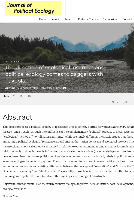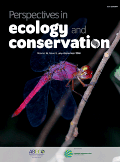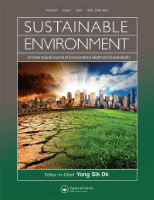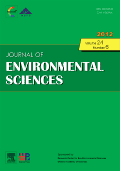
AMBIO
metrics 2024
Connecting disciplines to shape the future of environmental science.
Introduction
AMBIO, published by Springer, is a prestigious journal that has been at the forefront of environmental research since its inception in 1973. With an ISSN of 0044-7447 and an E-ISSN of 1654-7209, this journal provides a vital platform for the dissemination of interdisciplinary studies that intersect ecology, environmental chemistry, geography, and medicine. Based in the Netherlands, AMBIO holds a remarkable position in the academic world, ranked Q1 in multiple categories, including Ecology and Environmental Chemistry, reflecting its commitment to high-quality scholarly work. Researchers looking to contribute to or stay abreast of significant advancements in understanding and addressing contemporary environmental challenges will find AMBIO to be an essential resource, catering to the needs of a diverse audience comprising scholars, practitioners, and policymakers. While the journal is not open access, its wide-ranging influence in the social sciences, particularly regarding geography and development, alongside its high impact factor, underscores its importance for the future of environmental research.
Metrics 2024
 1.79
1.79 5.80
5.80 6.20
6.20 151
151Metrics History
Rank 2024
Scopus
IF (Web Of Science)
JCI (Web Of Science)
Quartile History
Similar Journals

People and Nature
Innovating Research at the Intersection of Life and EnvironmentPeople and Nature is an esteemed journal published by WILEY that has been a cornerstone in the field of ecology, evolution, behavior, and systematics since its inception in 2019. Featuring an impressive impact factor and categorically ranked in the Q1 quartile for 2023, this Open Access journal ensures broad dissemination of high-quality research, making it invaluable for researchers, practitioners, and students alike. With a strong Scopus ranking of 39 out of 721 in its category, People and Nature seeks to advance understanding of the intricate relationships between humans and the natural world. Operating from the United Kingdom, this journal offers vital insights into sustainable practices and environmental stewardship, urging the scientific community to foster a deeper connection with our ecosystems. By providing a platform for innovative and multidisciplinary research, it plays a pivotal role in addressing the pressing challenges faced by nature and society today.

Neotropical Biodiversity
Championing biodiversity for a sustainable tomorrow.Neotropical Biodiversity is a prominent journal dedicated to advancing our understanding of biodiversity and ecological dynamics within the Neotropical region. Published by TAYLOR & FRANCIS LTD in the United Kingdom, this Open Access journal has been providing unrestricted access to research findings since 2015, fostering collaboration and knowledge sharing among the global scientific community. With an emphasis on innovative research in Ecology, Ecology, Evolution, Behavior and Systematics, and Global and Planetary Change, it has earned a reputation for excellence, currently holding a Q3 category in its field. As of 2023, the journal ranks in the 37th percentile for Environmental Science (Ecology) and in the 36th percentile for Agricultural and Biological Sciences (Ecology, Evolution, Behavior and Systematics), making it a valuable resource for researchers, professionals, and students interested in understanding and preserving biodiversity in one of the world's most diverse ecosystems. We invite you to explore the cutting-edge research published in Neotropical Biodiversity and contribute to the ongoing dialogue for environmental sustainability and ecological resilience.

Frontiers in Conservation Science
Transforming Conservation Science Through Open AccessFrontiers in Conservation Science, published by Frontiers Media SA in Switzerland, is an esteemed open-access journal dedicated to advancing research in the field of conservation science. With an E-ISSN of 2673-611X, this journal aims to facilitate the exchange of knowledge among researchers, professionals, and students by publishing high-quality, peer-reviewed articles that explore innovative solutions to contemporary conservation challenges. Since its establishment in 2020, the journal has rapidly ascended to a Q2 ranking in the Nature and Landscape Conservation category, reflecting its commitment to impactful scholarship, as evidenced by its Scopus rank of #93 out of 211 in Environmental Science and a 56th percentile ranking. By promoting open access, Frontiers in Conservation Science ensures that vital research is widely disseminated, fostering collaboration and informed decision-making in the conservation community. This journal is a crucial platform for those dedicated to understanding and preserving our planet's biodiversity and landscapes.

Global Ecology and Conservation
Fostering global dialogue on biodiversity and sustainability.Global Ecology and Conservation, published by Elsevier, stands as a premier open-access journal dedicated to advancing the field of ecology and conservation science. Since its inception in 2014, the journal has facilitated the dissemination of high-quality research, fostering critical dialogue on ecosystem management, biodiversity preservation, and sustainability practices across the globe. With a remarkable ranking within the top quartiles (Q1) in various categories including Ecology, Evolution, Behavior and Systematics, and Nature and Landscape Conservation, it is positioned among the leading resources for researchers and professionals alike. The journal has garnered a notable impact, ranking #65 out of 721 in Ecology, and houses articles that are vital to understanding and addressing the pressing environmental challenges of our time. Available in an open-access format, researchers can freely access and share vital findings, promoting a collaborative approach to ecological research. Global Ecology and Conservation is not just a publication; it is a critical tool for innovation and advocacy in conservation, poised to inspire the next generation of environmental stewards.

Journal of Political Ecology
Fostering Dialogue on Environmental Justice and PolicyJournal of Political Ecology is a prestigious, open-access publication that has been at the forefront of interdisciplinary scholarship since 1994, hosted by UNIV ARIZONA LIBRARIES in the United States. This journal, identifiable by its ISSN 1073-0451, focuses on critical analyses of environmental issues as they intersect with social and political factors, making it an essential resource for researchers in the fields of Political Science, Geography, and Ecology. As of 2023, it boasts impressive rankings including Q1 in Geography, Planning and Development and Political Science and International Relations, highlighting its significant impact in these categories. Additionally, the journal ranks in the 86th percentile for Political Science and International Relations, further solidifying its position as a leading publication. The convergence of its content from 2011 to 2024 reflects a commitment to exploring contemporary environmental challenges through a political lens, catering to an audience of academics, practitioners, and students. With its strong reputation and commitment to open access, the Journal of Political Ecology is an invaluable platform for advancing scholarly discourse in an increasingly complex and interconnected world.

Perspectives in Ecology and Conservation
Innovative insights into conservation challenges and solutions.Perspectives in Ecology and Conservation, published by Elsevier Science Ltd, is a leading academic journal dedicated to advancing the fields of ecology, conservation, and environmental management. With a Q1 ranking in multiple categories, including Ecology, Management, Monitoring, Policy and Law, and Nature and Landscape Conservation, this journal boasts an impressive standing among its peers, making it essential reading for researchers and professionals. Since its inception in 2017 and running through 2024, it aims to provide innovative perspectives and critical analyses that enhance our understanding and practices in conservation science. The journal is accessible through open access options, facilitating broader dissemination of knowledge. Its commitment to addressing contemporary ecological challenges reinforces its importance in the academic community, promoting sustainable practices and informed policy-making in the face of urgent environmental issues.

Trees Forests and People
Exploring the Vital Connections Between Nature and HumanityTrees, Forests and People is an esteemed peer-reviewed journal published by Elsevier that commenced its journey in 2020 and focuses on the intricate relationships between trees, forests, and human communities. With its E-ISSN of 2666-7193, this journal serves as a vital platform for presenting cutting-edge research in disciplines such as forestry, environmental science, and management. Recognized for its impact within the academic community, it has achieved a prestigious Q1 ranking in both Economics, Econometrics and Finance (Miscellaneous) and Forestry, alongside a Q2 ranking in Management, Monitoring, Policy and Law as of 2023. Its Scopus rankings indicate robust positioning in various fields, appealing to a diverse audience of researchers, professionals, and policy-makers engaged in sustainable forest management and ecosystem services. By offering open access options, the journal ensures that critical findings are readily available to a global audience, fostering knowledge sharing and collaborative efforts aimed at addressing the pressing challenges in forest conservation and management.

PACIFIC CONSERVATION BIOLOGY
Navigating challenges, preserving the Pacific's natural heritage.PACIFIC CONSERVATION BIOLOGY is an esteemed academic journal published by CSIRO PUBLISHING, dedicated to advancing research in the fields of ecology and nature conservation. With a strong focus on the unique challenges and biodiversity of the Pacific region, this journal serves as a crucial platform for researchers, conservationists, and students alike to disseminate high-quality, impactful findings. Operating from Australia, it has become a significant resource since its inception in 1993, navigating through nearly three decades of vital scholarly communication. Ranked in the Q2 category for both Ecology and Nature and Landscape Conservation as of 2023, PACIFIC CONSERVATION BIOLOGY maintains rigorous standards, as reflected in its successful Scopus rankings. The journal plays a pivotal role in addressing pressing ecological issues and fostering innovative conservation strategies, making it an essential reference for anyone involved in environmental science. Access options for the journal facilitate widespread distribution of knowledge, supporting the mission to promote informed decision-making in conservation practices.

Sustainable Environment
Connecting ideas, practices, and policies for a sustainable world.Sustainable Environment, published by Taylor & Francis Ltd, is a pioneering journal dedicated to advancing the field of sustainability studies. Since its inception in 2021, this open-access journal has sought to provide a platform for multidisciplinary research that addresses pressing environmental challenges and sustainable practices. With a commitment to disseminating high-quality research swiftly, Sustainable Environment aims to engage researchers, policymakers, and practitioners across various domains, fostering scholarly dialogue and innovation. The journal covers a broad range of topics, including climate change, resource management, and sustainable development, making it a vital resource for anyone looking to contribute to and understand contemporary environmental issues. With its flexible access options, readers from all backgrounds can benefit from the latest insights and findings in sustainability research, thereby promoting a more sustainable future.

Journal of Environmental Sciences
Leading the Way in Multidisciplinary Environmental ResearchJournal of Environmental Sciences, published by SCIENCE PRESS, is a premier scholarly journal dedicated to advancing knowledge in the multidisciplinary fields of environmental science, environmental chemistry, and environmental engineering. Established in 1970 and based in Beijing, China, this journal has consistently garnered recognition for its high-quality research, demonstrated by its Q1 rankings across multiple categories, including Environmental Chemistry, Environmental Engineering, and General Environmental Science. With an impressive Scopus rank of #11 for Environmental Science, the journal has firmly positioned itself within the top tier of its field, attracting contributions from leading researchers and academics worldwide. Although it operates under subscription access, the journal's commitment to disseminating critical insights into pressing environmental issues makes it an invaluable resource for professionals, researchers, and students striving to make impactful contributions to the understanding and management of environmental challenges.